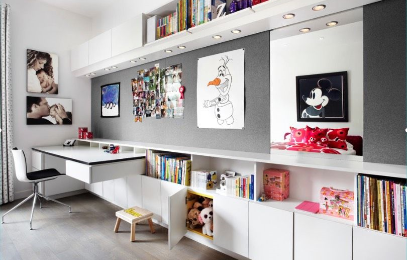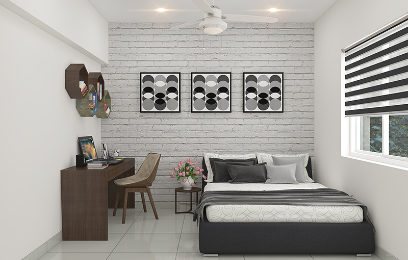Study room design considerations
A well-designed study room can significantly enhance productivity, focus, and creativity. Whether it’s for working, studying, or pursuing a hobby, the right environment can make a world of difference. Here are key considerations to keep in mind when designing your study room.
1. Location and Space
Choose a location that minimizes distractions and promotes focus:
-
Quiet Zone: Select a room or corner away from high-traffic areas like the living room or kitchen.
-
Natural Light: Opt for a space with plenty of natural light to reduce eye strain and boost mood.
-
Privacy: If possible, use partitions or doors to create a sense of separation from the rest of the home.
2. Ergonomic Furniture
Comfortable and functional furniture is a must for any study room:
-
Desk: Invest in a spacious desk with enough surface area for books, a laptop, and other essentials.
-
Chair: Choose an ergonomic chair with adjustable height and good lumbar support to avoid discomfort during long hours of use.
-
Storage: Incorporate shelves, drawers, or cabinets to keep the space organized and clutter-free.
3. Lighting Matters
Proper lighting enhances productivity and reduces strain:
-
Task Lighting: Use a desk lamp with adjustable brightness for focused lighting on your workspace.
-
Ambient Lighting: Install overhead lights or wall sconces for general illumination.
-
Natural Light: Position the desk near a window for daytime work but use blinds or curtains to control glare.
4. Color Palette and Mood
The colors in your study room can influence your focus and energy levels:
-
Neutral Tones: Soft whites, beiges, and grays create a calming environment.
-
Energizing Shades: Light blues, greens, or yellows can stimulate creativity and focus.
-
Accent Colors: Add pops of vibrant colors through decor or accessories to keep the room visually interesting.
5. Organization and Storage
An organized study room fosters a clutter-free mind:
-
Shelving Units: Wall-mounted shelves save space and keep books and materials within reach.
-
Desk Organizers: Use trays, pen holders, and file racks to keep your desk tidy.
-
Hidden Storage: Consider multi-functional furniture like ottomans with storage or desks with built-in compartments.
6. Technology and Connectivity
A modern study room should cater to technological needs:
-
Power Outlets: Ensure sufficient outlets near the desk for charging devices.
-
Cable Management: Use cable organizers or concealed wiring to maintain a neat appearance.
-
Wi-Fi: Place the study room within range of your router or use a Wi-Fi extender for uninterrupted connectivity.
7. Acoustic Considerations
Minimize noise for better concentration:
-
Soundproofing: Add rugs, curtains, or acoustic panels to absorb sound.
-
White Noise: Consider using a white noise machine or fan to block out distracting background noises.
8. Personalization and Inspiration
Make the study room uniquely yours to stay motivated:
-
Wall Decor: Add motivational posters, artwork, or a bulletin board for notes and reminders.
-
Plants: Indoor plants like succulents or peace lilies can improve air quality and add a touch of nature.
-
Hobbies: Dedicate a small corner to display items related to your interests or achievements.
9. Ventilation and Comfort
A comfortable environment is essential for long hours of study:
-
Temperature Control: Use fans, heaters, or air conditioning to maintain a pleasant temperature.
-
Fresh Air: Ensure good ventilation to prevent stuffiness.
-
Comfortable Flooring: Add a rug or carpet for warmth and comfort underfoot.
10. Adaptable Layout
Design the study room to adapt to future needs:
-
Modular Furniture: Opt for pieces that can be reconfigured or expanded as needed.
-
Flexible Zones: If the space is shared, create defined areas for different activities.
-
Growth Space: Leave room for additional storage or equipment as your requirements evolve.
Final Thoughts
Your study room should be a harmonious blend of functionality, comfort, and personal style. By incorporating these considerations, you can create a space that inspires focus and productivity while reflecting your unique preferences. Remember, a well-designed study room is an investment in your personal growth and success.
Blogs and Insights
Lorem ipsum dolor sit amet, consectetur adipiscing elit
View All blogs

